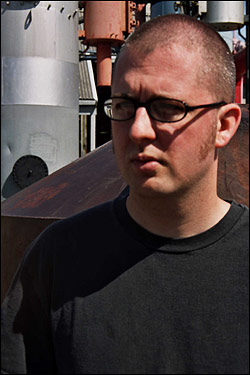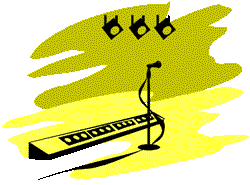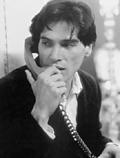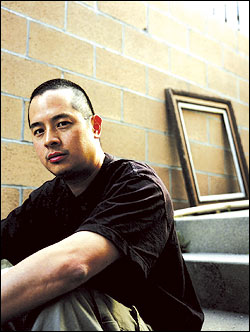Twenty-nine-year-old techno producer Jeff McIlwane, aka Lusine, was already one of Seattle’s best dance producers, but his forthcoming Serial Hodgepodge (out Nov. 23 on Detroit’s Ghostly International label) seals his crown. Building on the click-and-flutter grooves of 2002’s Iron City (credited to Lucine icl. and issued on Hymen/Mad Monkey), Serial glitters with aural gold dust, scattered across beats that lope from skewed post-hip-hop (“Ask You,” “Everything Under the Sun”) to 2-step (“The Stop”) to straight house (“Falling In”). Lusine’s set at this weekend’s Decibel Festival should provide a healthy taste—and a highlight of a pretty noteworthy bill. We chatted with McIlwane last week over lunch at the Blue Star Cafe in Wallingford.
Seattle Weekly: Where are you from originally?
Jeff McIlwane: I grew up in Dallas, lived there until I was 18, then I went to undergrad in Austin and lived there for five years before moving out to L.A. to go to school. I was studying sound design, but they didn’t have very good classes at the University of Texas, so I went out to Cal Arts pretty soon after I finished school there, to study that a little bit more—[for work in] film or video games, and then also in the hopes of still doing music on the side. I’ve lived in Seattle a year and a half.
When you were going to school, were you involved in the music scene in Austin at all? Had you been playing in high school, prior to college?
Not in high school, but I played a few shows in Austin before I went to California, as Lusine.
So that was always your alias?
Pretty much.
When you started out, was there anybody in particular you were trying to emulate?
There were a few people, for sure. Like, the first time I saw this guy Young American Primitive perform back in ’93—his stuff was kind of like a mixture between experimental and hip-hop music, very ethereal, ya know, synthy sounding stuff—and then also Warp [Records], Aphex Twin, Autechre, stuff like that.
How would you characterize the difference between your music then and now?
I think I jump around in different styles a lot more now. When I started out, it was much more focused on the experimental electronic realm. Now I’m jumping into dance music and some sort-of hip-hop stuff and some acoustic stuff a lot more.
What was the milieu like in L.A. when you went there? Did you find yourself getting into the electronic scene, or were you just mostly concentrating on school?
Well, there really is a very big electronic scene in L.A., but I always thought [there were] so many people there, and so many people doing electronic music—on any given night there’s, like, five different shows that are really good—so it’s really hard to get into a real scene in L.A. because it’s so dispersed in the city.
How did you hook up with Ghostly International?
Sam [Valenti IV, label head] asked me for some music about two or three years ago, through my distributor or something like that. I had gone to [the label’s] first tour when they came through L.A. I didn’t meet them then, but that was when I was first introduced to them.
The thing that strikes me about them is that they’re really going for it in a way that a lot of techno labels have tended to shy away from. Did that attract them to you?
Yeah, definitely. You know, he knows what he’s doing when to comes to the artwork and music and press and everything combined, just pushing his product really well. Because it’s one thing to be cool, but then it’s another thing to put so much into that and not really to try to get people to notice it.
What made you decide to move to Seattle?
I have some friends that lived up here. One friend, we did some commercial work together—he does scores for movies—and I wanted to work with him on some music. But my main reason for moving was I just couldn’t deal with L.A. It was just really difficult to try to continue to work on music, and the shows we did in L.A. were just not good at all. I thought it would be a lot better to be in a smaller city with a smaller scene.
How would you describe your live show?
It depends on who I’m playing with, because if I’m playing with somebody that’s gonna be more dance oriented, then I will do a very much up-tempo set. As much as I can, I try to do some more experimental things, just because I know that the more I play live sets, the more I really feel that you need to understand your audience; you can’t just alienate them by playing experimental. But when I have the opportunity, I try to as much as I can.
Lusine plays the Decibel Festival with Jeff Samuel, Mr. Projectile, Solvent, and Kill Memory Crash at Chop Suey at 9 p.m. Thurs., Sept. 23. $10. He plays with Loscil at the Lower Level at 8 p.m. Sun., Sept. 26. $10. $65 for four-day pass.








